Tokenized Stock Investment Calculator
Investment Calculator
Results will appear here
Enter your investment details to see potential returns
Based on historical stock price data. DSTOQ tokenized stocks may not have real trading volume or liquidity as reported in the article. This calculator is for educational purposes only and does not guarantee actual returns.
Most crypto exchanges let you trade Bitcoin, Ethereum, or meme coins. DSTOQ does something completely different. Instead of trading native cryptocurrencies, it lets you trade tokenized stocks like Tesla, Amazon, and Apple - right on the blockchain. If you’ve ever wanted to own a fraction of a Tesla share without opening a brokerage account, DSTOQ is trying to make that possible. But is it real? Is it safe? And who’s actually using it?
What DSTOQ Actually Does
DSTOQ isn’t another Binance or Coinbase clone. It doesn’t list Dogecoin or Solana. Instead, it takes real-world assets - stocks, bonds, ETFs, even commodities - and turns them into digital tokens on the Stellar blockchain. These aren’t speculative tokens. They’re legally structured as security tokens, meaning each one represents actual ownership of the underlying asset. If you buy a DSTOQ token for one share of Amazon, you own a digital claim on one real Amazon share, backed by a legal framework designed to comply with financial regulations.
This isn’t just tech magic. It’s a legal and technical bridge between Wall Street and blockchain. The tokens are created using DSTOQ’s proprietary system, which ties each digital token directly to a physical asset held in custody. Think of it like a digital depository receipt - similar to how ADRs let you buy foreign stocks on U.S. exchanges, but built on blockchain.
Why Stellar Blockchain?
DSTOQ chose Stellar for a reason. Unlike Ethereum, which can cost $10+ in gas fees and take minutes to confirm, Stellar settles transactions in 2-5 seconds with fees under a penny. That’s critical when you’re trading assets that move in real time, like stocks. The platform uses Stellar’s built-in decentralized exchange (DEX), which runs a full central limit order book on-chain. That means you can set buy and sell orders at specific prices, just like on a traditional exchange - but without intermediaries.
Stellar’s focus on financial inclusion also aligns with DSTOQ’s mission. The network was built to serve underbanked populations. DSTOQ uses that same ethos: targeting markets like Vietnam, Nigeria, Brazil, and Indonesia, where traditional stock trading is hard to access. You don’t need a U.S. bank account or a high minimum balance. Just a smartphone and an internet connection.
What You Can Trade
DSTOQ offers tokenized versions of blue-chip stocks, major ETFs, government bonds, and commodities. You can trade tokenized shares of Tesla, Amazon, Microsoft, and Apple. You can also get exposure to the S&P 500 index or gold without buying physical gold or a brokerage account. The asset list isn’t huge - it’s focused on high-demand, liquid assets - but it’s enough to give you real portfolio diversification.
Unlike crypto exchanges that list hundreds of obscure tokens, DSTOQ keeps it tight. No Shiba Inu. No random DeFi coins. Just real-world assets with clear value. That’s intentional. The platform isn’t trying to be a gambling den. It’s trying to be a regulated, transparent way to invest.
Who’s Behind It?
Craig McGregor is the public face of DSTOQ. He’s appeared at industry events explaining how the legal structure works - how tokenized securities comply with securities laws in multiple jurisdictions. The platform’s connection to the Stellar Development Foundation is also telling. Stellar doesn’t partner with just any project. Its involvement suggests DSTOQ’s technical architecture has been reviewed and approved by a credible blockchain entity.
But here’s the catch: there’s no public team page. No LinkedIn profiles. No press releases from major financial news outlets. DSTOQ operates quietly. That’s not necessarily bad - many fintech startups start this way - but it does make due diligence harder.
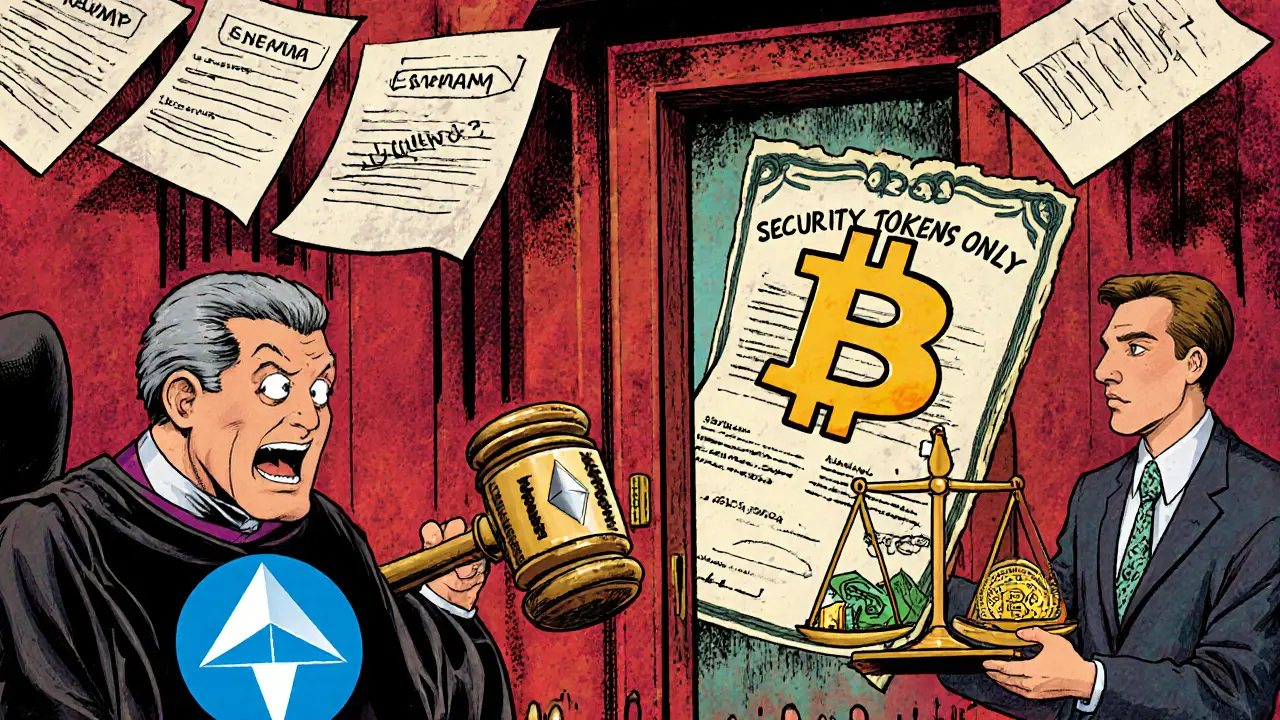
The Big Problem: No Trading Data
Here’s where DSTOQ gets shaky. If you check CoinMarketCap, DSTOQ is listed as an untracked exchange. That means no trading volume, no order books, no active pairs. No one is reporting trades. No one is tracking liquidity. Reddit has zero discussions about it. Twitter has no active community. YouTube has no tutorials. There’s no evidence anyone is actually using it to trade.
That’s a red flag. A platform that tokenizes real stocks needs liquidity to function. If no one is buying or selling, the whole system is theoretical. You can’t own a tokenized Tesla share if there’s no one to sell it to. And if you can’t exit your position, it’s not an investment - it’s a digital collectible.
It’s possible DSTOQ is still in private testing. Maybe it’s waiting for regulatory approval in Vietnam before opening to the public. But if that’s the case, they should say so. Silence creates suspicion.
Who Is This For?
DSTOQ isn’t for crypto traders looking to flip coins. It’s for people in emerging markets who want real exposure to global markets but can’t access them. A farmer in rural Vietnam who can’t open a U.S. brokerage account might use DSTOQ to buy tokenized shares of Apple. A small business owner in Nigeria might use it to hedge against inflation by owning tokenized gold.
It’s also for investors who believe in tokenization as the future of finance - not as a hype cycle, but as a legal, regulated evolution. If you think stocks should be as easy to trade as crypto, DSTOQ is one of the few platforms trying to make that happen.
The Risks
There are three big ones:
- No liquidity - You might not be able to sell your tokens when you want to.
- Unclear regulation - DSTOQ claims compliance, but there’s no public proof of licenses in target countries.
- No user reviews - If no one’s talking about it, you have no idea if the platform works as advertised.
Also, because it’s tied to real assets, if the legal structure fails - say, if a court rules the tokenization isn’t valid - your tokens could become worthless. That’s a systemic risk you don’t face with Bitcoin or Ethereum.
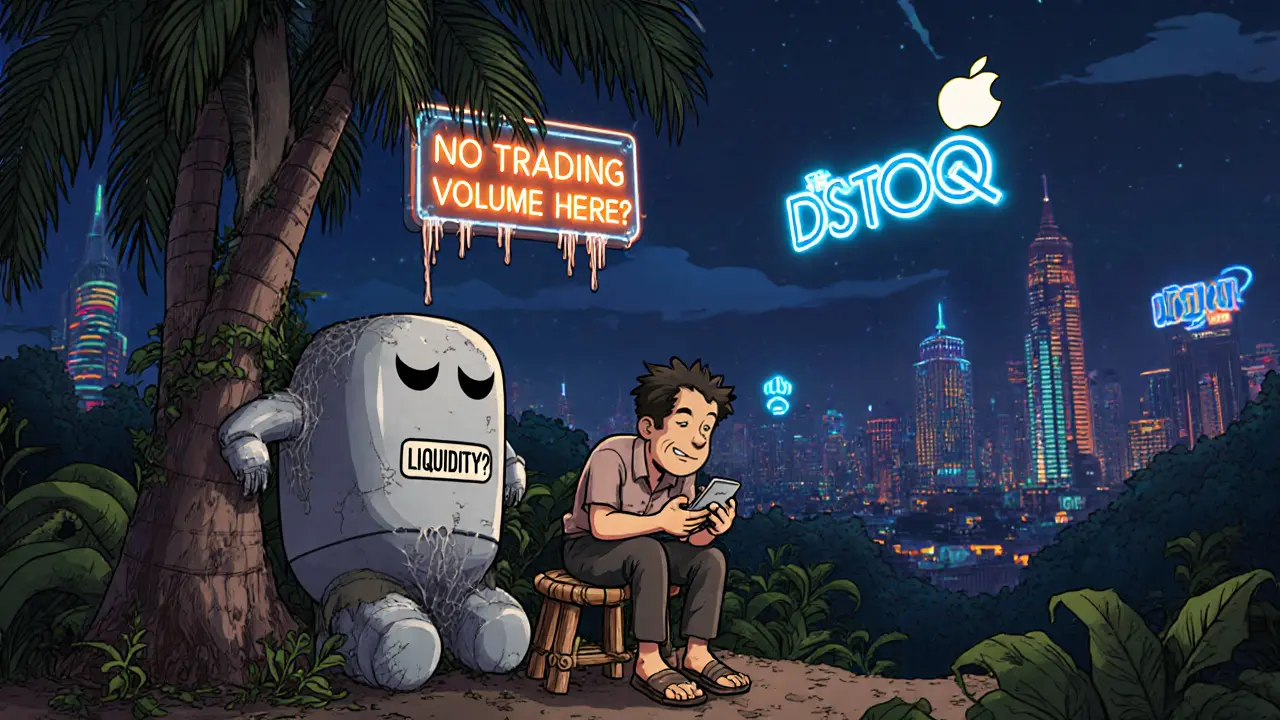
Is DSTOQ Legit?
Technically? Yes. The concept is sound. The technology is solid. Stellar is reliable. The legal framework has been explained by industry insiders.
Practically? Unknown. There’s no proof it’s working at scale. No trading volume. No users. No transparency.
It’s like a restaurant with a great menu but no customers. The food might be amazing - but if no one’s eating it, something’s wrong.
If you’re in a developing market and you’re curious, you could sign up and see what happens. But don’t deposit money expecting to trade. Treat it like a beta test. Watch for updates. Look for trading pairs to appear on CoinMarketCap. Wait for user reviews to emerge.
For now, DSTOQ is an idea with potential - not a proven platform.
How It Compares
DSTOQ doesn’t compete with Binance. It competes with tZERO, Securitize, and other security token platforms. Here’s how it stacks up:
| Feature | DSTOQ | tZERO | Securitize |
|---|---|---|---|
| Blockchain Used | Stellar | Ethereum | Custom blockchain |
| Transaction Speed | 2-5 seconds | 15-60 seconds | Varies |
| Fees | Undisclosed (likely low) | Higher (Ethereum gas) | Higher |
| Target Markets | Emerging economies | U.S. and Europe | U.S. and Europe |
| Trading Volume | Untracked | Active | Active |
| User Base | Unknown | Thousands | Thousands |
DSTOQ’s edge is speed and cost. Its weakness is adoption. tZERO and Securitize have been around longer, have regulatory licenses, and have real users. DSTOQ is the underdog with better tech - but no proof it’s working yet.
Final Verdict
DSTOQ is a bold experiment. It’s not a scam. It’s not a Ponzi. But it’s also not a finished product. The idea of trading real stocks on a blockchain is powerful. The execution? Still unproven.
If you’re in a country with limited access to global markets, keep an eye on DSTOQ. Watch for trading volume to appear. Look for news about regulatory approvals in Vietnam or Nigeria. Check if users start posting reviews.
Right now, it’s a promising concept in a quiet room. Not a marketplace. Not a platform. Not yet.
Is DSTOQ a real crypto exchange?
Yes, but not in the way most people think. DSTOQ is a blockchain-based platform that lets you trade tokenized versions of real stocks and bonds - not Bitcoin or Ethereum. It’s a hybrid between a traditional brokerage and a crypto exchange. It’s real as a concept, but there’s no public proof it’s actively trading yet.
Can I trade Tesla shares on DSTOQ?
According to their stated model, yes. DSTOQ tokenizes shares of major companies like Tesla, Amazon, and Apple. But since there’s no public trading data or order book, you can’t confirm if these tokens are actually being bought or sold. The ability to trade them exists on paper - not in practice.
Is DSTOQ available in the U.S.?
There’s no official confirmation. DSTOQ’s public focus is on emerging markets like Vietnam, Nigeria, and Brazil. The U.S. has strict securities regulations, and most platforms like tZERO handle compliance there. DSTOQ hasn’t announced U.S. availability, and given the regulatory environment, it’s unlikely to launch there first.
Why is DSTOQ not tracked on CoinMarketCap?
CoinMarketCap only tracks exchanges with measurable trading volume. DSTOQ is listed as "untracked," meaning no volume data is being reported - either because trading hasn’t started, or because no one is reporting it. This is a strong signal that the platform isn’t active yet, or is operating in a very limited capacity.
Is DSTOQ safe to use?
It’s too early to say. The technology is built on Stellar, which is secure. The legal structure is explained by industry insiders. But without public trading activity, user reviews, or regulatory proof, there’s no way to verify safety. Never deposit funds unless you see active trading and verified user testimonials.
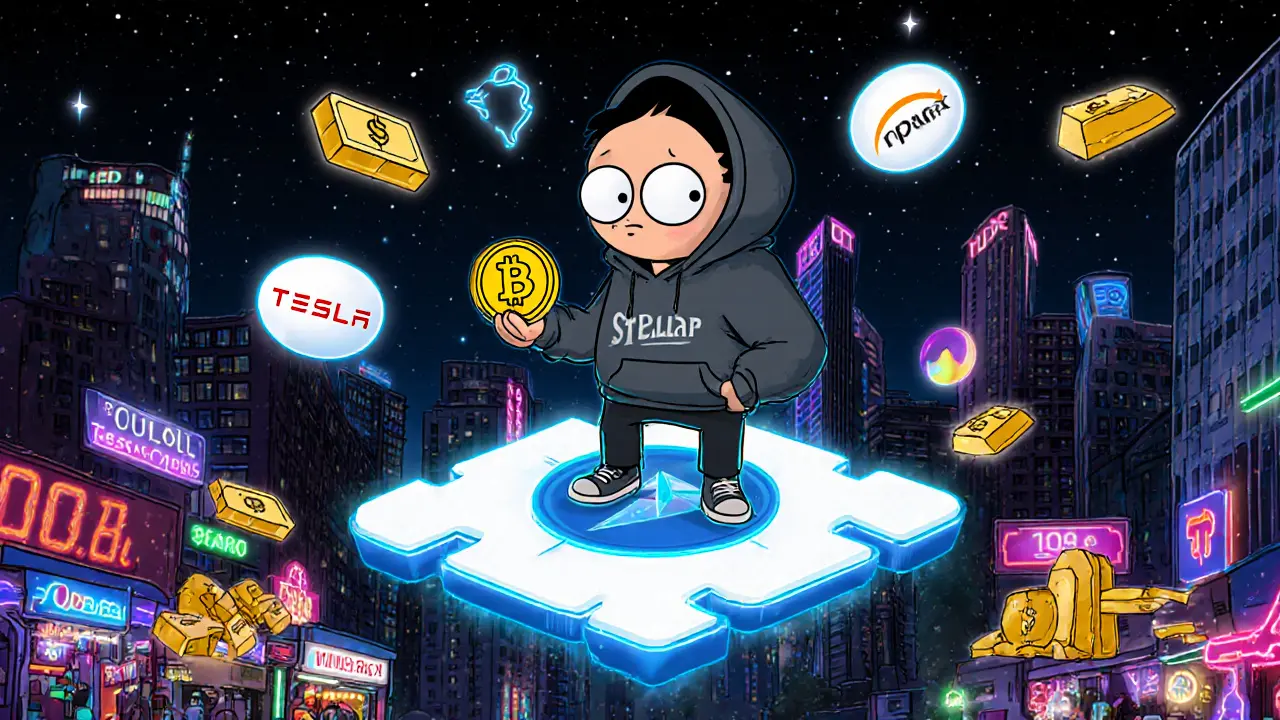
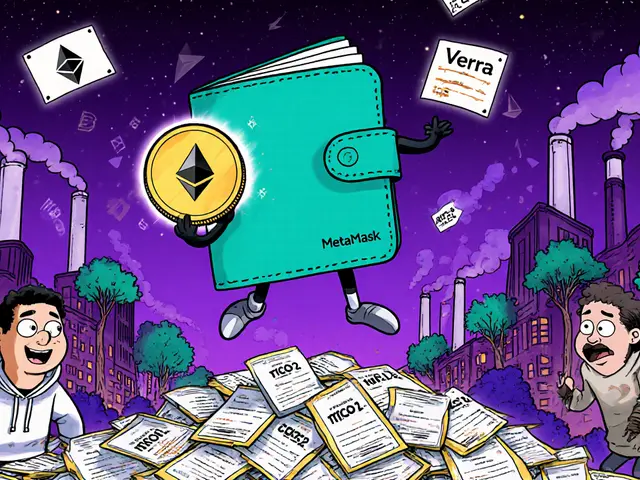
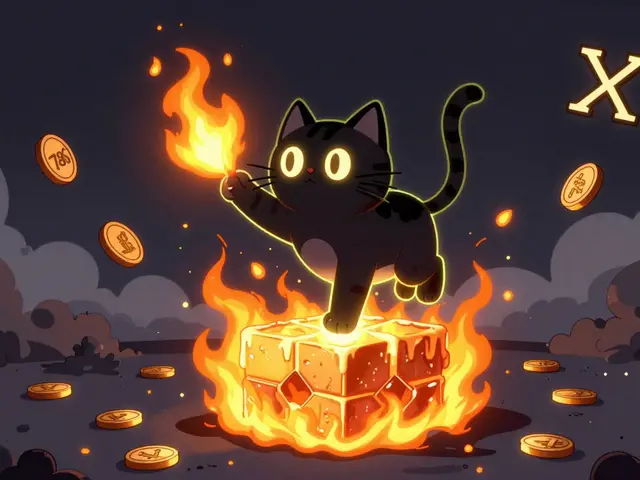
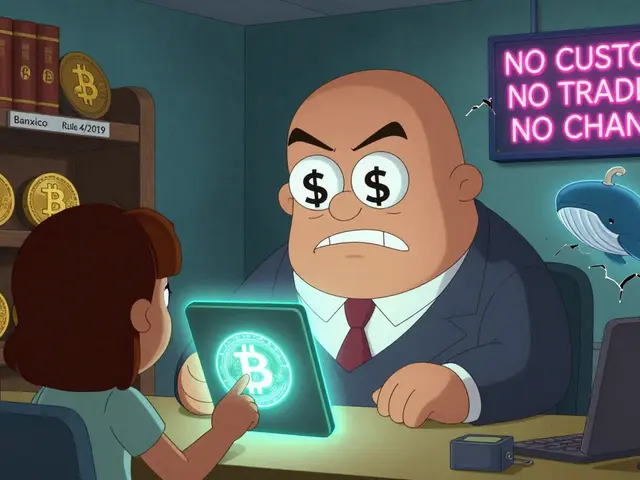


Arthur Crone
DSTOQ? More like D-STOQ (Don’t Stake Our Quarters). No volume? No users? No licenses? Just a PowerPoint deck with blockchain buzzwords and a Stellar logo. This isn’t finance-it’s performance art for crypto bros who think ‘tokenization’ means ‘magic fairy dust.’